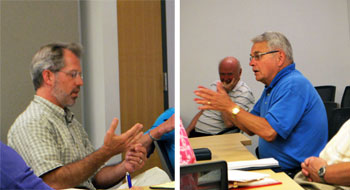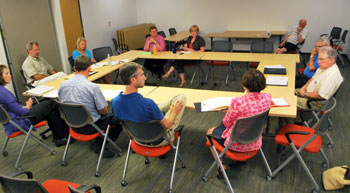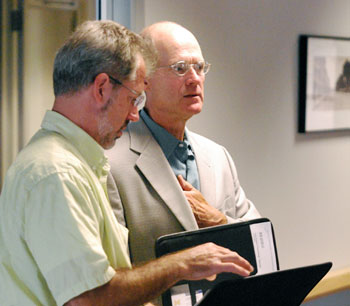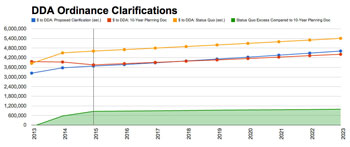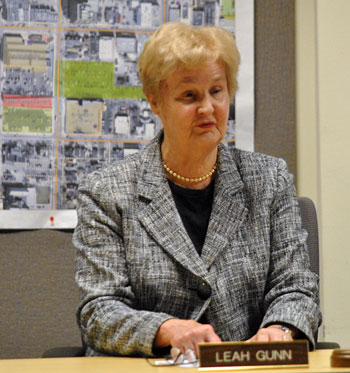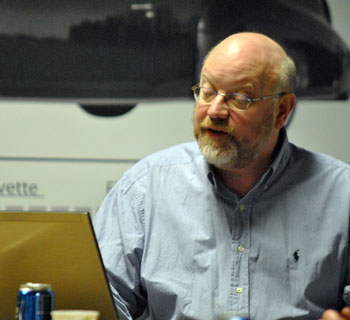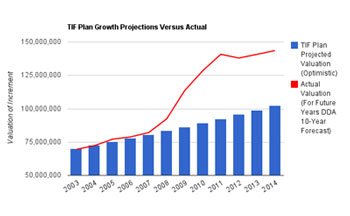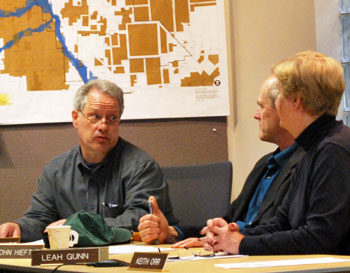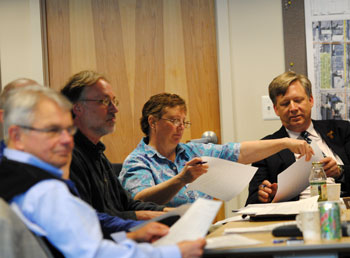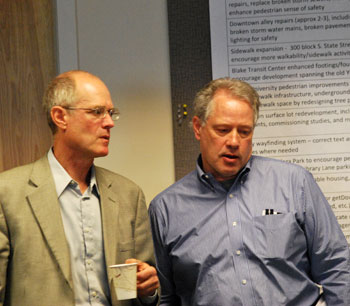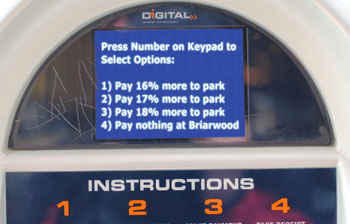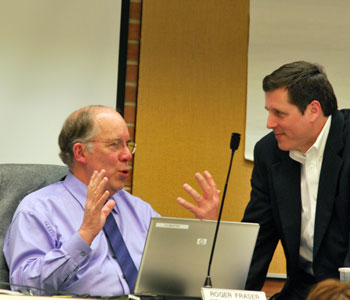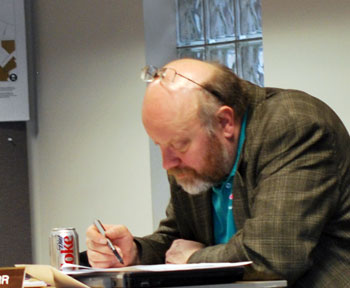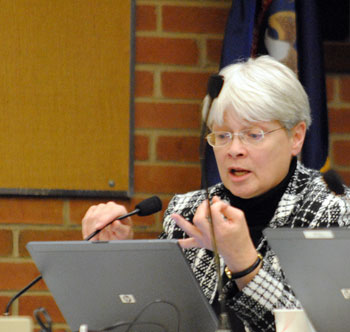DDA Tackles Street Lights, Land Sale Issue
Ann Arbor Downtown Development Authority board meeting (Dec. 4, 2013): At its last regular meeting of the year, the board approved the final funding necessary to replace 81 light poles on Main Street, passed a resolution waiving a claim to reimbursement for the DDA’s costs associated with the former Y lot, and formally accepted its audit report for the fiscal year that ended on June 30, 2013 (FY 2013).

On Dec. 4, 2013, city administrator Steve Powers attended his first DDA board meeting as a member. (Photos by the writer.)
The board also considered a resolution added to the agenda on the day of the meeting, related to the contribution-in-lieu (CIL) parking agreement for the 624 Church St. project – but ultimately decided to table that resolution pending further review at the committee level.
The DDA’s Dec. 4 resolution allocating $280,000 for the Main Street light pole replacement ended the political wrangling over who should pay for those downtown Ann Arbor light poles. Replacement of the deteriorating poles was identified by the city as a need in the first half of 2012. The source of an estimated $600,000 required for the project was specified in the city’s CIP (capital improvements plan) that year as coming from the DDA – though the funds were at that time not authorized by the board.
In the spring of 2013, the city council weighed how it might clarify the city’s ordinance that restricts the DDA TIF (tax increment finance) capture. In that context, DDA executive director Susan Pollay told the council that the DDA might not be able to afford to pay for the Main Street light pole project – if the council changed the ordinance language to clarify the calculations in a way that did not favor the DDA. The question of the DDA’s TIF capture was not ultimately settled until the council’s Nov. 18, 2013 meeting.
In the interim, the city council voted at its May 20, 2013 meeting to request that the DDA allocate at least $300,000 for the $580,000 light pole project. After the council then declined at its Oct. 21, 2013 meeting to approve a budget allocation for the remaining $280,000 that was needed for the project, the DDA board passed its Dec. 4 resolution, citing the urgency of replacing at least 36 of the poles as the reason for its decision.
According to the DDA’s resolution, staff will use the DDA funding to begin now with replacement of those poles most in need of being removed, with the remainder replaced in the summer of 2014.
Also at its Dec. 4 meeting – in connection with the city’s pending sale to Dennis Dahlmann of the former Y lot, at William Street and Fifth Avenue – the DDA board passed a resolution that waived claim to $1,439,959 in reimbursements from the sale that the DDA has calculated it might be owed. The city council adopted a policy on Oct. 15, 2012 that included depositing net proceeds (after reimbursements) from the former Y lot sale into the city’s affordable housing trust fund.
So the DDA board’s action is an attempt to increase the amount that will be deposited into the affordable housing trust fund. The resolution passed by the DDA board also calls on the city council to waive the city’s claim to reimbursements. The city purchased the property in 2003 for $3.5 million and has made interest-only payments for the last 10 years on a loan for that amount. The agreed-upon sale price to Dahlmann is $5.25 million.
In another formal action taken on Dec. 4, the DDA board accepted the audit report from the most recently concluded fiscal year – FY 2013, which ended June 30, 2013. The auditor issued an “unmodified” or clean opinion.
The board also considered a request, which was ultimately tabled, from the developer of the 624 Church St. project. The developer is asking for an extension of the contractual agreement under which parking permits could be purchased using the city’s contribution-in-lieu (CIL) program. The program allows a developer to satisfy certain zoning requirements that parking spaces be provided for a project – by purchasing monthly permits in the public parking system at a premium rate, instead of building the spaces on site. The developer of the 624 Church St. project wants the ability to extend the 15-year minimum to cover a 30-year financing period – based on feedback from firms that would be providing the financing. The DDA board ultimately voted to table the question pending further review by the board’s operations committee.
The board’s newest members introduced themselves at the meeting: city administrator Steve Powers and Main Street retailer Cyndi Clark.
Also at its Dec. 4 meeting, the board heard a range of updates on various projects and public commentary. Highlights included a report from the Main Street BIZ (business improvement zone), which has enough money in its fund balance to handle sidewalk snow removal for the coming winter, without collecting the winter tax assessment to which it is entitled. In a separate update, there’s a possibility that downtown ambassadors could be hired by the DDA as soon as the summer of 2014.
Other topics covered in updates included the effort to save the State Theater, the NHL’s Winter Classic on New Year’s Day, and The Puck Drops Here festivities on New Year’s Eve. [Full Story]





